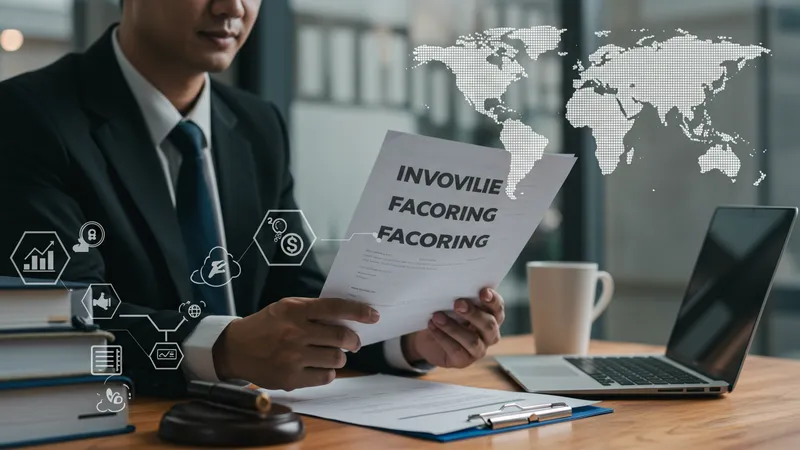

Did you know that small businesses face a cash flow crunch that can derail their growth in under six months? Invoice factoring offers a lifeline that many overlook but is rapidly becoming the backbone of thriving companies.
In today's volatile market, understanding how to quickly transform unpaid invoices into working capital can make or break a business. As the economic landscape shifts, knowing this secret could propel your company to the next level.

Invoice factoring has often been misunderstood and underutilized. Many see it as a last resort when it's actually a strategic cash flow enhancer. Businesses can turn invoices into instant cash, giving them the agility to outpace competitors. The flexibility it offers is unparalleled, yet few are tapping into its full potential. But that’s not even the wildest part…
The breathtaking part about invoice factoring is how it disentangles your company's growth from its cash cycle. Imagine having the flexibility to reinvest in your business without waiting on client payments. This not only keeps the wheels turning but propels the engine of innovation and expansion. Yet, what's even more astonishing is how this tool has become a game-changer for startups. What happens next shocked even the experts…
For many, the decision to use invoice factoring feels like a leap into the unknown. The surprise? The power of factoring lies in its immediacy. Unlike bank loans, which can take weeks or even months to process, factoring provides near-instant cash flow to capitalize on new opportunities. For instance, imagine securing a lucrative contract yet lacking the immediate funds to fulfill it. Invoice factoring can solve this dilemma almost overnight.

Furthermore, the assumption that factoring is a costly affair is one of its biggest misconceptions. In reality, the fees associated are often outweighed by the benefits of maintaining steady cash flow. This allows businesses to meet obligations, pay employees, and invest in growth without the burden of loan interest rates. The financial freedom it unlocks is often eye-opening, but there’s one more twist…
Gaining flexibility through invoice factoring also allows businesses to weather unpredictable economic climates. One might think of factors during economic downturns, but the truth is, they offer a buffer that can sustain even during peak seasons. This flexibility is vital, allowing businesses to navigate market demands seamlessly. And as we explore further, the impact of factoring on creditworthiness might change everything you know.
This counterintuitive tool can even improve a company’s credit rating. By immediately resolving outstanding invoices, businesses exhibit financial responsibility. Over time, this can bolster their creditworthiness, unlocking better terms from suppliers and lenders alike. What you read next might change how you see this forever.
In today's economy, where the pace of business frequently outstrips the synchronicity of cash flow, invoice factoring represents not just an opportunity but an essential tool. Consider this: Traditional bank loans are becoming harder to secure, leaving growing businesses in a cash-flow conundrum. Factoring provides a lifeline by converting receivables into immediate funds.

Beyond immediacy, factoring allows a business to diversify. Companies often hesitate due to misconceptions about the cost, but the immediateness offers unparalleled agility. Businesses can seize opportunities without the wait, meeting new demands as they arise. This aspect is crucial in dynamic industries where timing can mean everything.
Factoring also allows for a more methodical approach to cash flow management. By offering a predictable funding stream, businesses can plan accurately, avoiding the feast-and-famine cycle. Such consistency is invaluable, especially for startups and SMEs striving for stability during periods of expansion. But there's even more to consider…
Moreover, the reinvestment potential that factoring provides is astonishing. With invoices solved ahead of payment deadlines, companies can reinvest into product development, marketing strategies, and workforce expansion before the competition has a chance to blink. What you discover on the next page might unravel new horizons.
Although the benefits of invoice factoring are numerous, businesses must be aware of the concealed costs that can accompany this financial strategy. Often camouflaged by the allure of immediate cash flow, some contracts may harbor hidden fees or trap businesses into unfavorable terms. Insight into these elements is crucial during negotiations with factoring companies.

There’s a world of difference in the percentage fees charged in contracts. While some providers are transparent, others may require businesses to dig deeper into detailed agreement terms. It's imperative to understand any additional charges, like early termination fees or credit check costs, which can significantly affect your company’s budget.
But factoring isn't one-size-fits-all. The impact on customer perception and relationship maintenance is a nuanced component. When collections are needed, the approach taken by factoring companies can influence your client relations. Businesses must choose providers that align with their brand's image, ensuring that partnerships don’t compromise customer goodwill.
Balancing these factors requires diligence, but awareness and preparation can mitigate potential negative impacts. Exploring how different providers operate and the nuances of each agreement uncovers a multi-layered enhancement to your cash flow strategy. Yet, this isn't the only surprise on this journey…
Modern technology has revolutionized invoice factoring, reshaping it into a digital prodigy that supports faster, more precise transactions. Platforms harnessing artificial intelligence and big data now fuel these services, offering automated processes that were unthinkable just a few years ago. Automation has reduced the need for manual intervention, accelerating approval times and cutting down on operational drag.

The integration of AI facilitates better risk assessment, granting businesses a clearer financial picture. These platforms analyze mountains of data, discerning client creditworthiness with pinpoint accuracy. The result is more reliable transactions, safeguarding both parties and strengthening the bedrock of trust upon which these agreements are built.
Blockchain technology is further refining the factoring industry by ensuring unparalleled transparency and security. Traceable transactions within immutable ledgers offer confidence against potential errors or fraudulent activities, a fear that previously shadowed traditional methods. The growing trust in digital platforms is setting a new standard, and the implications are vast.
With each technological advance, there's an expanding horizon in factoring possibilities, making it more responsive to the demands of modern business. Through embracing these innovations, companies can eliminate inefficiencies and unlock vast potential. What awaits could redefine your understanding of financial freedom.
Let's dive deeper into one of the hidden benefits of invoice factoring that rarely gets the attention it deserves: the positive impact on a company’s credit score. Contrary to some beliefs, factoring can stabilize cash flows and lead to early payment of obligations, which often reflects positively in credit ratings.

Companies that use factoring can promptly pay their credit obligations, showcasing financial discipline. Over time, this improved reputation fuels better credit terms with suppliers and financial institutions. A healthy credit score can mean the difference between securing better financing or remaining tethered to disadvantageous terms.
On the flip side, regular financial audits that come with some factoring agreements can serve as a valuable internal check-up. Often, businesses discover renewed areas for improvement during these reviews, further contributing to financial robustness. These audits are more than compliance—they're opportunities to refine strategic initiatives for sustainable growth.
Such transformations underscore that invoice factoring is not merely a quick-fix for cash shortages. It’s a catalyst for financial resilience that fosters growth. As you read on, the veil will lift on more astounding facets of this financial tool.
Invoice factoring might sound like a panacea, but it’s important to evaluate its fit for your specific business model. The deciding factor often lies in your industry and the nature of your clientele. These elements shape the flow, size, and regularity of your receivables.

Professional service industries, for example, often use factoring more effectively than retail businesses, where economic fluctuations can sway invoice values. Understanding your industry's payment cycles will reveal whether factoring can seamlessly integrate with your operations without disruptions.
Moreover, your customer base plays a pivotal role in the equation. Businesses dealing with government contracts or established corporations often find factoring attractive since these clients typically adhere to payment schedules, minimizing risks. However, if your customer base is less predictable, you may need alternate solutions.
So, is factoring suitable for you? Assess your transaction volumes, client reliability, and overall strategic financial plan. A thoughtful investigation will reveal if factoring is the missing piece that can elevate your financial capabilities. The next segment might hold the key insight you didn’t know you needed.
Choosing the right factoring company is essential to unearthing the potential benefits without succumbing to pitfalls. Start by vetting companies based on industry-specific experience. An understanding of your unique market dynamics ensures tailored solutions are offered.

Transparency is key. Reputable factoring partners will guarantee clarity in contracts, openly displaying terms, fees, and associated costs. Opacity should raise immediate red flags, signaling potential mismatches or soon-to-surface complications.
Customization in services is another vital factor. From online platform capabilities to customer service standards, the range of services offered can greatly impact the factoring experience. Personalization stems from understanding your needs and adapting solutions to match, fostering long-term partnerships.
The landscape of factoring is vast, but armed with insights, you can cement relationships that not only support growth but become a strategic ally in your financial framework. Stay tuned for the next groundbreaking revelation in this conversation.
Businesses often ask: why choose factoring over traditional loans? The answer lies in the diversity of advantages. Unlike loans, factoring does not burden a business with long-term debt or affect existing credit lines, making it an attractive option for growth-focused companies.

While a loan ties funds to future cash flows, factoring liberates working capital tied up in receivables immediately. This agile approach provides opportunities for reinvestment, allowing businesses to meet operational demands without deferring initiatives due to cash constraints.
Moreover, loan approval processes are traditionally cumbersome, riddled with extensive credit checks and collateral requirements. In contrast, factoring streamlines access to funds as approvals hinge on client creditworthiness rather than the company’s financial history, broadening potential.
Understanding these distinctions offers clarity when choosing the right path for your business. In the grand chess game of strategic financial management, factoring emerges as a forward-thinking gambit. With each page, the potential applications unfold in ways that could redefine your business strategy.
Safety in financial dealings is prime real estate in decision-making. Concerns about factoring often revolve around the perceptions of reliability and confidentiality. Reputable companies prioritize upholding stringent privacy standards, safeguarding client and customer information.

Moreover, the evolution in factoring, influenced by digital advancements, has fortified security measures. Encrypted transactions and robust compliance frameworks ensure that sensitive data is as secure as any financial institution. It's about improving access while retaining integrity and trust.
Companies must also be aware of reputational impacts. Choosing a factor that aligns with brand values and practices ethical debt collection builds a shield around your customer relationships, reinforcing rather than harming trust.
The assurance you gain from selecting reliable factoring partners extends beyond immediate benefits—it fosters long-term stability and persistent growth opportunities. Next, let’s journey further into unexplored territories of financial innovation.
In evolving marketplaces, distinctive business models have emerged by integrating factoring into their financial DNA. Subscription-based and SaaS companies, for instance, rely on factoring to smooth out recurring payment cycles, fueling consistent scale-up without cash hiccups.

E-commerce firms, thriving under flexible, scalable platforms, also increasingly leverage factoring to maintain inventory levels and respond swiftly to consumer demand. This adaptability keeps them ahead in the fiercely competitive online trading environment.
Thus, factoring isn't limited to traditional sectors but finds its utility across various innovative business landscapes. Unexpected alliances form as new industries discover the hidden treasures within factoring agreements, propelling previously uncharted growth.
The transformation from an old-money financial tool to a modern-day enabler illustrates just one extraordinary narrative within the financial spectrum. The unfolding stories reveal a horizon rich with potential for any business deft enough to tap into these reservoirs.
While invoice factoring offers liberating advantages, the backdrop of regulatory requirements cannot be ignored. In various regions, factors need to adhere to specific licensing and compliance mandates, ensuring standardized practices and secured transactions.

Understanding these stipulations is crucial when selecting a factoring partner. A regulatory oversight not only ensures your financial movements are law-abiding but also guards against potential legal entanglements. This diligence not only aligns with corporate ethics but provides peace of mind amid financial freedoms.
Industry-specific regulations may also dictate additional requirements, impacting which factoring companies qualify for your business. Thus, choosing partners familiar with your industry’s legal framework adds another protective layer to your cash flow mechanism.
As landscapes constantly evolve, knowing these underwriting details sustains continuity. The regulatory challenges offer underappreciated value, ensuring fairness and consistency. The next chapter promises to unveil even more revelations hidden beneath the regulatory surface.
Forecasting future trends, invoice factoring stands at the cusp of another transformative era. With digital integrations and AI-driven advancements, factoring as a service is being reimagined, promising to further blend liquidity solutions with precision analytics.

Emergent trends point to more personalized offerings, echoing user experience patterns seen in other fintech innovations. As companies become adept at leveraging big data, tailored factoring solutions extend unprecedented value to businesses of all scales.
The potential reach of these developments is boundless, rewriting what’s possible beneath invoice factoring's umbrella. In the foreseeable landscape, factoring evacuates any vestiges of antiquity, emerging as a state-of-the-art financial accelerator.
These progresses unravel factoring beyond a mere financial practice, elevating it to a strategic asset foreseeing the immediate and long-term horizon. Concluding this series, the final piece sheds light on the pivotal evolution set to redefine the industry.
Embarking on the invoice factoring journey requires insight, foresight, and the willingness to redefine constraints. Recognizing the invaluable role this tool plays across industries, from mitigating cash flow imbalances to enabling agile growth, is the first step.

Tactful navigation hinges on choosing the right partner and integrating technological advancements swiftly. The agile strategies factoring unlocks distinctly mark the difference between mundane operational cycles and dynamic, responsive models.
As you deliberate on implementing this strategy, consider the exponential value proposition that lies within extracting timely value from your invoices. The factoring revolution is not just a possibility; it's a momentum towards efficiency interlaced with innovation.
To fully engage with this narrative, embrace each innovation with clarity and intent, leveraging them to stand at the forefront of business advancement. The onus is on you to steer your legacy forward.
The hidden prowess of invoice factoring is more than just a path to financial security. It's about opening doors to reinvestment, expansion, and strategic resilience. Miss it at your peril, but master it to unlock unforeseen potential.
Every growing business faces inevitably tough decisions, but missing out on the advantages that factoring holds should not be one of them. Explore, experiment, and engage now, and see firsthand what can be achieved when cash constraints are a thing of the past. Share this discovery, bookmark it for future reference, and take decisive action—because financial readiness waits for nobody.